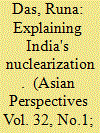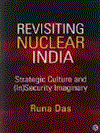|
|
|
Sort Order |
|
|
|
Items / Page
|
|
|
|
|
|
|
| Srl | Item |
| 1 |
ID:
082252


|
|
|
|
|
| Publication |
2008.
|
| Summary/Abstract |
This article presents an analytical hybrid of realism and critical social constructivism as its theoretical framework, and representations of (in)securities as an interpretation of politics, to explain India's nuclearization policies. Arguing that a linkage of political leaders' ideologies, articulation of statist identities, and (in)securities defines a state's security practices, I compare how the ideological perceptions of the postcolonial Indian state's leaders have articulated divergent notions of nationalisms, nationalist identities, and (in)securities and corresponding nuclear-policy choices. In charting this comparison, I explore how the political, economic, and developmental insecurities perceived by the Indian state under the Congress Party have become communal/cultural under the Bharatiya Janata Party, thereby facilitating the BJP's justification of India's nuclear-weapon tests. The article thus hopes to add to our understanding about the security problematiques of states and communities.
|
|
|
|
|
|
|
|
|
|
|
|
|
|
|
|
| 2 |
ID:
155165


|
|
|
|
|
| Summary/Abstract |
This article uses Edward Said’s post-colonial framework to analyze India–United States (US) nuclear security relations in the post-Cold War period as a clash of US Orientalism and India’s nuclear sovereignty as a key marker of India’s post-colonial essence. Through an analysis of the discourses of India and the US with regard to India’s May 1998 detonation and the 123 Agreement, it explores the following questions: To what extent has America’s security relationship with India been characterized by Orientalist discourses? Does the revision of the US post-9/11 security relationship with India as evidenced through the 123 Agreement indicate continuity or change in America’s Orientalist discourses vis-à-vis the nuclear policies of the Indian state? How has this shaped India’s nuclear nationalism? In exploring these questions, it will be argued that US security discourses reflective of Orientalism have constructed India along Orientalist lines; have structured US security policies towards the nuclear strategies of the Indian state (thereby consolidating India’s nuclear nationalism); and, that the revision of the US security relationship with India post-9/11 shows a continuity of America’s Orientalism towards the Indian state and its nuclear program. The article concludes with an analysis of the implications of Orientalism on South Asian security/International Relations.
|
|
|
|
|
|
|
|
|
|
|
|
|
|
|
|
| 3 |
ID:
140428


|
|
|
|
|
| Publication |
New Delhi, Sage Publications India Pvt Ltd, 2015.
|
| Description |
ix, 329p.hbk
|
| Standard Number |
9789351501220
|
|
|
|
|
|
|
|
|
|
|
|
Copies: C:1/I:0,R:0,Q:0
Circulation
| Accession# | Call# | Current Location | Status | Policy | Location |
| 058292 | 355.2170954/DAS 058292 | Main | On Shelf | General | |
|
|
|
|
| 4 |
ID:
096041


|
|
|
|
|
| Publication |
2010.
|
| Summary/Abstract |
A plethora of theoretical perspectives have explained India and Pakistan's nuclearization. Such arguments, while partially correct, offer little that incorporates how the constitutive nature of states' identities explain their perceptions of (in)securities and nuclear policy choices. In this article, I offer an interpretive analysis of India and Pakistan's nuclear trajectory by exploring the representations of (and the connections between) their nationalist identities, perceptions of insecurities and nuclear policy choices. Following the critical constructivist premise, I argue that while India and Pakistan have justified their nuclear policies on the basis of certain geo-strategic (in)securities, the interpretation of what constitutes their national selves and (in) securities have been driven by their historical legacies, economic or developmental anxieties, and their political leaders' (or states') ideologies. Seen from this critical constructivist perspective, I particularly draw attention to a conjectural moment of South Asian politics, where, following India's nuclear detonation under the BJP in May 1998, the nuclear (in)security discourses of India and Pakistan have drawn from cultural re-articulations of their nationalist identities and (in)securities to justify their nuclear policies. I conclude by suggesting the need to engage realism (i.e. the material realm) with critical constructivism (i.e. the interpretive realm) to comprehend cultural productions of identities and (in)securities in inter-state politics.
|
|
|
|
|
|
|
|
|
|
|
|
|
|
|
|
| 5 |
ID:
098849


|
|
|
|
|
| Publication |
2010.
|
| Summary/Abstract |
Despite a rich volume of scholarship on strategic culture and security, scant attention has been paid in such studies to explore the representations of strategic cultures and insecurities in international politics. To address this lacuna, I follow in this article a critical constructivist reading of strategic culture and insecurity, with an eye at examining some of its conceptual, theoretical and analytical premises, which, despite incorporating how various aspects of strategic cultures define security choices, have shared the realist notion of anarchy as given in international politics. In doing so, I offer a critical constructivist analysis highlighting the socially constructed nature of and the mutually constitutive relation between the representations of India's strategic culture, statist identity, insecurities and nuclear policies. Drawing from my case study, I conclude by offering some suggestions along a critical constructivist line to conceptually, theoretically and analytically broaden the existing understandings of strategic cultures and states' security practices.
|
|
|
|
|
|
|
|
|
|
|
|
|
|
|
|
| 6 |
ID:
129082


|
|
|
|
|
| Publication |
2014.
|
| Summary/Abstract |
In this article I explore how the post-9/11 neo-liberal climate of globalization has served as the context within which is articulated masculinist and orientalist forms of nuclear discourses between India and the United States (US). To this extent, I draw from feminist international relations (IR), that security is a gendered phenomenon, to explore the linkages between masculinities and nuclear weapons as underpinning the nuclear security discourses between India and the US. Yet considering issues of international hierarchy and power relations between India and the US, I also draw from Edward Said's Orientalism to explore how assumptions of orientalism are also sustained in these masculinist nuclear discourses. My contribution lies in enriching feminist IR with a post-colonial angle by suggesting that feminist IR continue to engage with post-colonial feminist perspectives to comprehend the masculinist and orientalist forms of identity politics that underpin security relations/discourses between Western and post-colonial states.
|
|
|
|
|
|
|
|
|
|
|
|
|
|
|
|
|
|
|
|
|